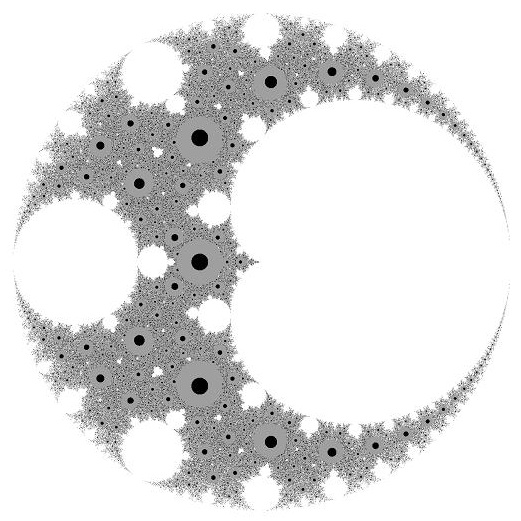|
Research
|
| A short
autobiography |
 |
I grew up in central Florida,
the son of citrus farmers. I went to
college at the University
of North Carolina at Chapel Hill, where I
originally intended to become a medical
doctor. But I became fascinated with
mathematics as a student and changed career
paths. I completed an undergraduate senior
thesis (studying among other things the picture
you see at left) under the direction of Jane
M. Hawkins and graduated with my
bachelor's degree in 2000. I went on to earn a Ph.D. in mathematics from the University of Maryland in May 2006, completing my thesis under the direction of the late Daniel J. Rudolph. My mathematical genealogy can be found here. Since completing my education, I held postdoctoral positions at Northwestern University and Swarthmore College before joining the Ferris State faculty in 2012. From 2021 to 2023 I served as an organizer of the Little School Dynamics research group, sponsored by the American Institute of Mathematics. Click here for my curriculum vitae. My Erdos number is 4, but my Erdos-Bacon number is infinite. |
| Research
interests |
| I study ergodic theory. To get
an idea of what this is, consider the following
example. Suppose you were interested in
determining the "average" temperature of water
in a lake. One thing you could do is put a
bunch of thermometers at various spots in the
lake, take readings from each of these
thermometers (at the same instant), and average
these readings. Another thing you could do
is to take one thermometer, attach it to a fish
and take readings from this one thermometer
every minute, averaging the readings you get. A key principle of ergodic theory is that these two methods of averaging will coincide, so long as the movement of the fish is reasonable (by "reasonable", I mean that the fish should eventually swim in all parts of the lake). Ergodic theory concerns itself (among other things) with describing the "average" behavior of systems that change over time by examining probabilistic and statistical properties of dynamical systems (a dynamical system is any mathematical model for a quantity that changes as time passes; think of the location of the fish as the dynamical system in the above example). Historically speaking, the motivating problems of ergodic theory come from physics, but ideas in ergodic theory have been applied in other areas of mathematics as well as in biology, chemistry, economics, and other fields. For more on dynamical systems and ergodic theory, click here and here. My past work includes: - complex dynamics of quadratic rational maps - descriptive dynamics and ergodic theory of continuous semigroup actions - applications of ergodic theory to number theory, particularly the complexity theory of multiple ergodic averages My current work explores the "speedup equivalence" of actions of commuting transformations in both the measure-preserving and topological categories. Outside of ergodic theory, I am also interested in connections between math and games, and in applications of mathematics and statistics to sports analytics, and have worked with students on projects in these areas in the past. Click here for my papers and click here to see slides from my talks. |
| Undergraduate
research |
| I am always interested in working
with students in independent study courses
and on research projects. In the past I have directed independent studies in: - dynamical systems and chaos - measure theory and Lebesgue integration - vector calculus and differential geometry - mathematical biology - topology - statistical methods in sports analytics Several of my students have presented posters at local, regional and national events and four have had papers published (see below). If you are interested in an independent study or undergraduate research project (I have lots of ideas, and I am also willing to learn new math to meet your interests), email me or stop by my office. |
| Papers by my
undergraduate students |
|
Michael Nadrowski, "An
analysis of methods used to measure major college
football recruiting classes and assign star ratings to
recruits"
Mathematics and Sports 3 (2022), 1-20. Jonathon Wilson, "Entropy of LEGO(R) jumper plates" in J. Beineke and J. Rosenhouse (Eds) The Mathematics of Various Entertaining Subjects Volume 3, Princeton University Press, Princeton, NJ (2019), 287-311. Anzhane' Lance, "Dynamics of the family l(z + 1/z + 1)", preprint (2018) Allie Wicklund, "A sex-age, density-dependent matrix model for white-tailed deer populations incorporating annual harvest", preprint (2016) Tyler George, "E-ergodicity and speedups of ergodic systems" Rose-Hulman Undergraduate Math. J. 16 (2015) 72-87. Keith Goldner, "A Markov model of football" J. Quant. Anal. Sports 8 (2012) (online, 16 pp.) |
